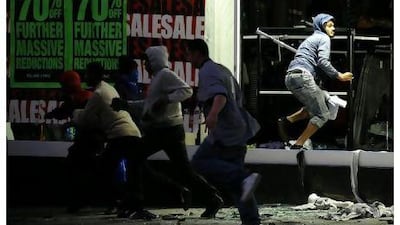LONDON // Police tripled the number of officers in the British capital last night in a bid to stem the rising tide of violence.
The force also considered using rubber bullets to help stop the lawlessness that has erupted in London and other major cities.
In pictures: Riots spread in London
Rioting spread across London on a third night of violence, with unrest flaring up in other English cities.
Residents and businesses spent yesterday clearing up after the third and worst night of rioting had left scenes of devastation.
As the evening approached they hunkered down fearful of a fourth night of looting and violence.
Last night the rioting had spread to Manchester where a fashion store was set on fire in the city centre and hundreds of youths ran through the street smashing windows, the Press Association reported.
Incidents were also reported in Salford, Wolverhampton, where stores were raided, and West Bromwich, where cars were set alight.
As the turmoil developed into a political crisis, British Prime Minister David Cameron cut short his Italian holiday to fly home for a meeting of the government's emergency committee yesterday and for a midsummer recall of parliament tomorrow.
Speaking after the unrest spread to more affluent neighbourhoods of London, Mr Cameron said: "People should be in no doubt that we will do everything necessary to restore order to Britain's streets and make them safe for the law-abiding."
He added that 16,000 officers would be on the streets of London last night, almost three times the number out on Monday night.
Police said yesterday that plastic bullets would be "one of the tactics" available to officers.
The first fatality of the riots was a man shot in a car in Croydon, south London, on Monday night. Police have launched a murder inquiry.
There has been near-unanimous condemnation of the unrest, committed mostly by youths from deprived inner-city estates. But London mayor Boris Johnson was heckled as he toured burnt-out Croydon yesterday, when a middle-aged man shouted: "Listen to the black youth."
Authorities blamed criminal gangs intent on looting for fostering the violence that has involved both black and white youths.
Britain's coalition government has rejected calls, mostly from right-wing politicians, for tougher measures, such as the use of water cannons or the armed forces.
"The way we police in Britain is through consent of communities," Theresa May, Conservative home secretary, told Sky News.
British insurers have estimated that millions of pounds of damage has been inflicted and the unrest forced the cancellation of a friendly England versus Holland football match at Wembley Stadium tonight.
London will host the Olympic Games in less than a year but officials are confident the global event will be secure.
"Security has been a top priority in the planning and preparation for London 2012 and we have full confidence in the work being done to prepare for the games," said the British Olympic Association.
The chaos started on Saturday night following a vigil for Mark Duggan, a 29-year-old black man shot to death by police last week.
Violence soon flared on the streets of Tottenham, north London, while Sunday night saw the rioting spread to other parts of London.
By Monday night, large areas of the capital and provincial cities across the country were taken over by youths looting, burning cars and property and attacking the police.
An inquest into Duggan's death heard yesterday that he died of a single gunshot wound to the chest.
The circumstances leading to his death are also the subject of an inquiry by the Independent Police Complaints Commission.
The IPCC said yesterday it had found no evidence that Duggan had fired a gun at officers.
His relatives, who insist he was law-abiding, have criticised the subsequent violence.
"We want to establish the truth about Mark's death," said a statement from the family.
"The disorder going on has nothing to do with finding out whathappened to Mark." Britain has not seen such widespread unrest since the 1980s, when Conservative prime minister Margaret Thatcher imposed far-reaching economic changes such as privatisations and cuts to the public sector.
The present coalition between the Conservatives and Liberal Democrats has overseen deep austerity cuts to tackle ballooning budget deficits that also afflict much of the western world.
Police called the latest violence the worst in memory and it stretched the London force's capabilities to a level not seen since the suicide terror attacks of July 7, 2005.
Critics say budget cuts and a focus on terrorism left police unprepared for civil unrest.
Monday's violence started in Hackney, east London, in the late afternoon daylight and in the glare of television cameras broadcasting live from helicopters.
Within hours, youths communicating via social media and instant messaging were rampaging across London and other cities, including Birmingham, Bristol, Liverpool and Nottingham.
Police chiefs and politicians appeared on television to urge parents to check on their children and keep them at home.
They also told all Londoners to stay in rather than watch the unrest and impede the police and emergency forces trying to cope.
As officers combed through CCTV footage, they urged the public to come forward if they knew anyone involved in criminal activity.
More than 500 people have been arrested so far and London's police cells were full, forcing the service to use stations outside the capital.
Jenny Jones, a member of London's assembly, said disaffected youth need community projects to bring them back into mainstream society, similar to those used with extremists.
"The vast majority of young people have nothing to do with this," she said. "But we do need to look at why the perpetrators of this violence are so alienated from society.
"This is about young people who deeply feel that they do not have a stake in society, some of whom were already engaged in criminal activity."

